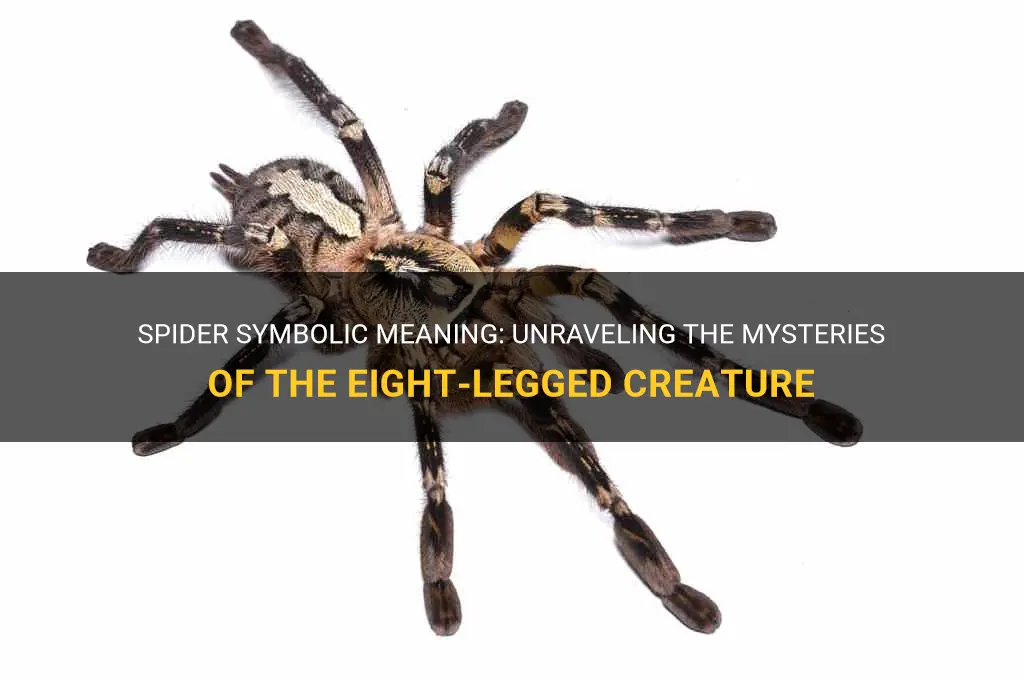
Spiders, with their delicate yet intricate webs, have long been intriguing creatures that have captured the imagination of humans. While some may find them creepy or frightening, others are fascinated by their mysterious and complex nature. In many cultures and religions, spiders hold symbolic meaning that goes beyond their physical appearance. From ancient myths to modern symbolism, spiders represent a wide range of qualities and characteristics, including creativity, patience, and strength. In this article, we will explore the fascinating world of spider symbolism and delve into the deeper meanings behind these remarkable arachnids.
What You'll Learn
- What is the symbolic meaning of spiders in different cultures or religions?
- How do spiders symbolize creativity and the weaving of intricate webs?
- What does the spider symbolize in popular literature and folklore?
- Are there any negative connotations associated with spider symbolism?
- How has the symbolic meaning of spiders evolved over time?

What is the symbolic meaning of spiders in different cultures or religions?
Spiders have traditionally been associated with different symbolic meanings in various cultures and religions around the world. These complex creatures have often been seen as a representation of both positive and negative qualities, depending on the cultural context.
In some cultures, spiders are regarded as creatures of great wisdom and creativity. For example, in Native American mythology, the spider is often seen as a helper and a grandmother figure. The Navajo tribe believes that the Spider Woman created the universe and taught the people how to weave. In this culture, the spider is a symbol of artistic sensibility, patience, and the power of creation.
Similarly, in African folklore, spiders are often portrayed as clever and cunning tricksters. In the Ashanti culture of Ghana, Anansi the spider is a beloved mythological character known for his quick thinking and ability to outsmart others. Anansi is seen as a symbol of wisdom, storytelling, and adaptability.
In Western cultures, however, spiders have often been associated with fear and danger. This fear may stem from the poisonous nature of some spider species found in these regions. As a result, spiders are commonly depicted as sinister and malevolent creatures in literature and popular culture. The fear of spiders is known as arachnophobia and is one of the most common phobias.
In some religious beliefs, spiders are believed to have a spiritual significance. In Hinduism, for example, spiders are associated with the goddess Maya, who is the weaver of illusion and the creator of the material world. The spider's ability to create intricate webs is seen as a metaphor for Maya's power to create the illusion of the physical world.
In Buddhism, spiders are often used as symbols of patience and perseverance. The story of the spider that tried to spin a web to reach enlightenment is a popular theme in Buddhist teachings. The spider symbolizes the importance of never giving up, even in the face of challenges and obstacles.
In Christianity, the spider is often seen as a negative symbol representing deceit and evil. This negative interpretation can be traced back to the biblical story of King David hiding in a cave from his enemies. According to the story, a spider spun a web across the entrance of the cave, leading his pursuers to believe that nobody could have possibly entered or exited. As a result, the spider is often associated with deception and trickery in Christian symbolism.
In conclusion, spiders have a wide array of symbolic meanings in different cultures and religions. While they are seen as wise and creative in some cultures, they are feared and associated with deception in others. Ultimately, the symbolic meaning of spiders is shaped by the cultural beliefs and experiences of each individual.
Decoding the Meaning of Mitsubishi's Warning Lights and Symbols: What Do They Really Signify?
You may want to see also

How do spiders symbolize creativity and the weaving of intricate webs?
Spiders have long been associated with creativity and the weaving of intricate webs. In many cultures and mythologies, spiders are seen as symbols of artistic expression and inventive thinking. The way they construct their webs with precision and beauty has captivated human imagination for centuries.
One of the reasons spiders are often associated with creativity is their ability to weave intricate webs. These webs are not only functional for capturing prey but also visually stunning. The patterns, symmetry, and delicate threads are a testament to the spider's artistic abilities. Their webs can be seen as a metaphor for the creative process, where ideas are interconnected and woven together to form a cohesive whole.
Furthermore, spiders are known for their patience and attention to detail when constructing their webs. They carefully select each strand and meticulously arrange them to create a strong and efficient structure. This meticulousness can be seen as a reflection of the creative process, where artists and inventors carefully craft their work, paying attention to even the smallest details.
In addition to their webs, spiders themselves are often portrayed as creative creatures. Their ability to adapt and innovate in order to catch their prey showcases their resourcefulness. They are constantly experimenting with different techniques and strategies to improve their chances of success. This adaptability can inspire individuals to think outside the box and push the boundaries of their own creative endeavors.
Spiders have also been associated with the concept of interconnectedness. Just as a spider's web is made up of numerous strands that are all connected, so too are various aspects of creativity. Artists and inventors draw inspiration from various sources, combining ideas and influences to create something unique. The interconnectedness of creativity is often compared to the intricate network of a spider's web.
In some cultures, spiders are also seen as symbols of creation and the weaving of stories. In African mythology, Anansi, the spider god, is known as the great storyteller who spins tales and weaves complex narratives. This association links spiders not only to creativity but also to the power of storytelling and the ability to shape narratives.
Overall, spiders symbolize creativity and the weaving of intricate webs through their elaborate constructions, their resourcefulness in catching prey, and their association with interconnectedness and storytelling. Their unique abilities and qualities serve as a powerful symbol for humans to embrace their creative potential and explore new possibilities. Just as a spider weaves its web, individuals can weave their own ideas and inspirations into something beautiful and meaningful.
The Deep Significance of Omega Symbol Tattoos Unveiled
You may want to see also

What does the spider symbolize in popular literature and folklore?
In popular literature and folklore, spiders have often been used as symbols to convey various meanings and themes. These eight-legged creatures are known for their intricate webs, which they use to catch their prey. This web-building ability has made them a symbolic representation of cunningness, patience, and creativity. Let's explore the symbolism of spiders in popular literature and folklore.
One common theme associated with spiders is their connection to weaving and creation. The act of spinning a web can be seen as a metaphor for the creation of a story or the complex interweaving of fate. In Greek mythology, the three Fates, represented as spinning, measuring, and cutting the thread of life, were often depicted as weaving and spinning like spiders. This symbolism suggests that spiders are the silent architects of our destinies.
Spiders are also commonly associated with trickery and manipulation. Their ability to catch their prey by building intricate webs is often seen as a representation of the deceit and cunningness of certain characters. In literature, spiders are sometimes used as symbols for characters with hidden agendas or those who manipulate others to achieve their goals. An example of this is the character of Shelob in J.R.R. Tolkien's "The Lord of the Rings." Shelob is a giant spider who lures unsuspecting victims into her webs, showcasing her ability to deceive and manipulate.
Furthermore, spiders have been associated with fear and the unknown in many cultures. Their eight legs, multiple eyes, and venomous bites have contributed to their enigmatic and eerie reputation. Spiders often appear in horror literature and movies, symbolizing the fear of the unknown or the hidden dangers that lurk in the shadows. Their presence creates a sense of unease and suspense, making them perfect symbols for the macabre.
In some cultures, spiders are considered to be protectors and bringers of luck. In Native American folklore, the spider is often depicted as a wise and benevolent creature that helps humans by providing them with knowledge and guidance. Some tribes believe that spiders are ancestors watching over them, and their webs serve as a spiritual link between the mortal and spiritual realms. This positive symbolism presents spiders as creatures to be revered and respected.
In conclusion, spiders have played a significant role in literature and folklore as symbols of creativity, deceit, fear, and protection. Their ability to create intricate webs, their association with manipulation, and their enigmatic appearance make them versatile symbols that can convey a wide range of meanings. Whether they are representing the clever and cunning characters or the hidden dangers that lie in wait, spiders continue to fascinate and intrigue us in various forms of storytelling.
Kokopelli Symbol Meaning: Exploring the Ancient Mythology of the Southwest
You may want to see also

Are there any negative connotations associated with spider symbolism?
Spider symbolism has been widely interpreted throughout history and across cultures. While many of these interpretations are positive or neutral, there are also negative connotations associated with spider symbolism. These negative connotations often stem from people's fear or discomfort with spiders, as well as from cultural or religious beliefs.
One of the main reasons why spiders are associated with negativity is because they are commonly feared by humans. Arachnophobia, the fear of spiders, is one of the most common specific phobias. This fear often translates into negative associations with spiders and their symbolism. People may see spiders as creepy or dangerous creatures, which can lead to negative connotations when interpreting their symbolism.
In some cultures, spiders are seen as symbols of deceit and manipulation. This is likely due to their ability to create intricate webs and their predatory nature. Spiders are known for trapping their prey in their webs, and this behavior has been associated with deceit and trickery. In certain mythologies and folklore, spiders are portrayed as cunning and cunning creatures that deceive others for their own gain. These negative connotations can be seen in the symbolism associated with spiders in these cultures.
Religion also plays a role in shaping the negative connotations associated with spiders. In some religious texts, spiders are mentioned in a negative light. In Christianity, for example, spiders are often associated with the devil and evil. This association comes from the story of the spider's role in the crucifixion of Jesus Christ. According to this story, a spider spun a web to cover the entrance of a cave where Jesus was hiding, preventing his pursuers from finding him. This act of the spider is interpreted as an act of evil or betrayal.
Despite these negative connotations, it is important to note that spider symbolism is not universally negative. In many cultures, spiders are associated with positive traits such as creativity, patience, and resilience. Their ability to create intricate webs is often seen as a symbol of creativity and artistic expression. The patience and persistence required to construct these webs also symbolize perseverance and resilience.
In Native American cultures, spiders are often seen as symbols of protection and creativity. For example, the Hopi people believe that Spider Woman, a powerful deity, created humans and taught them how to weave. Spider Woman is revered for her creativity and wisdom, and she is seen as a protector of the people.
In conclusion, while spider symbolism does have negative connotations associated with fear, deceit, and religious beliefs, it is important to recognize that these interpretations are not universal. In different cultures and contexts, spiders can symbolize positive traits such as creativity and protection. It is up to the individual to interpret spider symbolism based on their own beliefs and experiences.
The Power of Symbolically: Unlocking Hidden Meanings in Everyday Life
You may want to see also

How has the symbolic meaning of spiders evolved over time?
Over the centuries, spiders have held various symbolic meanings in different cultures and time periods. The symbolism associated with spiders has evolved significantly, reflecting changing societal beliefs and philosophical ideas. From ancient civilizations to modern times, spiders have been both feared and revered, embodying a range of concepts and emotions.
In many ancient cultures, spiders were seen as symbols of creativity and weaving. Their intricate webs were seen as a representation of the interconnectedness of life and the web of fate that governs human existence. The weaving skills of spiders were admired, and their ability to create intricate patterns became associated with the divine act of creation. In Greek mythology, the goddess Athena transformed a mortal woman named Arachne into a spider after she challenged the gods' ability to weave. This mythology symbolized the connection between spiders, creativity, and divine craftsmanship.
However, not all ancient cultures saw spiders in a positive light. In a significant number of societies, spiders were associated with darkness, deceit, and fear. Their venomous sting and predatory nature led to beliefs that spiders were connected to evil and witchcraft. In medieval Europe, spiders were regarded as creatures of the devil, and their presence was seen as a sign of bad luck or impending doom. This negative symbolism persisted for centuries and contributed to the development of the popular fear of spiders, known as arachnophobia.
In more recent times, spiders have taken on new levels of symbolism. In the realm of literature and art, spiders often represent mystery, intrigue, and manipulation. The works of writers like Edgar Allan Poe and artists like Salvador Dali feature spiders as sinister figures, symbolizing the darker aspects of the human psyche. Spiders have also become associated with the idea of patience and perseverance, as demonstrated by the famous proverb "if at first, you don't succeed, try, try again," which is often illustrated with a spider trying to build its web.
In some cultures, spiders have gained positive connotations as symbols of luck and prosperity. The spider's ability to swiftly navigate its web and capture prey has been associated with agility, adaptability, and quick thinking. In African and Native American folklore, spiders are often portrayed as clever tricksters who use their wits and cunning to outsmart their adversaries. In these cultures, spiders are considered to bring good fortune and are seen as protectors against evil spirits.
In conclusion, the symbolic meaning of spiders has evolved over time, reflecting the varying beliefs and values of different cultures and time periods. From representing creativity and the web of fate to symbolizing evil and deceit, spiders have played diverse roles in human mythology and psychology. Whether viewed as creators, tricksters, or dark omens, spiders continue to captivate and intrigue us with their fascinating symbolism.
Decoding the Mystery: What Does the Triangle Symbol Mean on My Phone?
You may want to see also
Frequently asked questions
The spider is a highly symbolic creature in many cultures around the world. In some cultures, it is seen as a symbol of creativity and weaving, representing the ability to create and connect different elements. In other cultures, the spider is associated with patience, persistence, and adaptability, as it patiently waits for its prey and adapts to different environments. Additionally, in some Native American cultures, the spider is believed to be a symbol of storytelling and communication.
In spiritual contexts, the spider is often seen as a symbol of balance and harmony. Its eight legs symbolize the infinite possibilities and connections in life, while its ability to create intricate webs represents the connection between the physical and spiritual realms. The spider is also associated with intuition and psychic abilities, reminding us to trust our instincts and tap into our inner wisdom.
Dreaming of spiders can have different meanings depending on the context. In general, spiders in dreams are often associated with creativity, feminine energy, and the transformative power of the subconscious mind. However, the specific interpretation may vary based on the dreamer's personal associations with spiders. For some, a spider dream may indicate a feeling of being trapped or entangled in a situation, while for others, it may symbolize a need to tap into their creativity and explore new possibilities.







